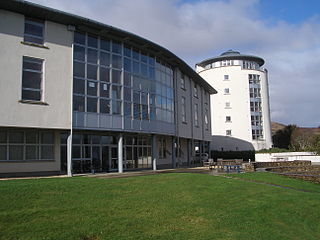Related Research Articles
Tony McManus is a guitarist from Paisley, Scotland who plays finger-style acoustic guitar arrangements of tunes from Celtic music, classical music, and other genres. McManus emigrated from Scotland to Canada in 2003.

Scotland is internationally known for its traditional music, which remained vibrant throughout the 20th century and into the 21st, when many traditional forms worldwide lost popularity to pop music. In spite of emigration and a well-developed connection to music imported from the rest of Europe and the United States, the music of Scotland has kept many of its traditional aspects; indeed, it has itself influenced many forms of music.

Scottish folk music is a genre of folk music that uses forms that are identified as part of the Scottish musical tradition. There is evidence that there was a flourishing culture of popular music in Scotland during the late Middle Ages, but the only song with a melody to survive from this period is the "Pleugh Song". After the Reformation, the secular popular tradition of music continued, despite attempts by the Kirk, particularly in the Lowlands, to suppress dancing and events like penny weddings. The first clear reference to the use of the Highland bagpipes mentions their use at the Battle of Pinkie Cleugh in 1547. The Highlands in the early seventeenth century saw the development of piping families including the MacCrimmons, MacArthurs, MacGregors and the Mackays of Gairloch. There is also evidence of adoption of the fiddle in the Highlands. Well-known musicians included the fiddler Pattie Birnie and the piper Habbie Simpson. This tradition continued into the nineteenth century, with major figures such as the fiddlers Niel and his son Nathaniel Gow. There is evidence of ballads from this period. Some may date back to the late Medieval era and deal with events and people that can be traced back as far as the thirteenth century. They remained an oral tradition until they were collected as folk songs in the eighteenth century.

Battlefield Band were a Scottish traditional music group. Founded in Glasgow in 1969, they have released over 30 albums and undergone many changes of lineup. As of 2010, none of the original founders remain in the band.
Temple Records is a record label founded in 1978 by Robin Morton, previously a member of The Boys of the Lough.
Catherine-Ann MacPhee is a Scottish Gaelic singer from Barra in the Hebrides, now resident in Canada. She has worked in the theatre and broadcasting as well as giving musical performances in Scotland, England, Canada and elsewhere. After a period living in Ottawa she moved to Halifax, Nova Scotia, in 2017.
Pibroch, piobaireachd or ceòl mòr is an art music genre associated primarily with the Scottish Highlands that is characterised by extended compositions with a melodic theme and elaborate formal variations. Strictly meaning "piping" in Scottish Gaelic, piobaireachd has for some four centuries been music of the Great Highland Bagpipe. Music of a similar nature, pre-dating the adoption of the Highland pipes, has historically been played on the wire-strung Gaelic harp and later on the Scottish fiddle, and this form is undergoing a revival.

Sabhal Mòr Ostaig is a public higher education college situated in the Sleat peninsula in the south of the Isle of Skye, with an associate campus at Bowmore on the island of Islay, Ionad Chaluim Chille Ìle. Sabhal Mòr is an independent Academic Partner in the federal University of the Highlands and Islands. Uniquely, its sole medium of instruction on degree courses is Scottish Gaelic.

Mill a h-Uile Rud is a Seattle-based band who sing in Scottish Gaelic.
Scottish fiddling may be distinguished from other folk fiddling styles by its particular precision of execution and energy in the delivery, for example, the rendering of the dotted-quaver/semi-quaver rhythmic patterns, commonly used in the Strathspey. Christine Martin, in her Traditional Scottish Fiddling players guide, discusses the techniques of "hack bowing", "the Scottish Snap", and "snap bowing". These techniques contrast quite sharply with the most common bowing patterns of Irish fiddling. The style has a very large repertoire consisting of a great variation of rhythms and key signatures. There is also a strong link to the playing of traditional Scottish bagpipes which is better known throughout the world.

The Celtic harp is a triangular frame harp traditional to the Celtic nations of northwest Europe. It is known as cláirseach in Irish, clàrsach in Scottish Gaelic, telenn in Breton and telyn in Welsh. In Ireland and Scotland, it was a wire-strung instrument requiring great skill and long practice to play, and was associated with the Gaelic ruling class. It appears on Irish and British coins, the coat of arms of the Republic of Ireland, Montserrat, the United Kingdom and Canada as well as the flag of Montserrat.
The Scots Trad Music Awards or Na Trads were founded in 2003 by Simon Thoumire to celebrate Scotland's traditional music in all its forms and create a high profile opportunity to bring the music and music industry into the spotlight of media and public attention. Nominations are made by the public and in 2019 over 100,000 public votes were expected across 18 categories.
Alasdair White is a Scottish folk musician born in 1983 on the Isle of Lewis, Outer Hebrides, Scotland. In 2001, when he was only 18 years old, he joined Battlefield Band as a virtuoso fiddle player.

Joy Dunlop is a Scottish broadcaster, singer, step dancer and educator from the village of Connel in Argyll, who now lives in Glasgow, Scotland. Singing predominantly in Scottish Gaelic, she performs folk music, song and dance in a contemporary style rooted in the tradition. She is a weather presenter for BBC Scotland and BBC ALBA.

Arthur Cormack is a Scottish Gaelic singer and musician from Portree, Isle of Skye and was educated at Portree High School.

Alison Kinnaird MBE, MA, FGE is a glass sculptor, Celtic musician, teacher and writer born in Edinburgh, Scotland. She is one of the foremost and most original modern glass engravers in Scotland.
Beg & Borrow is the thirty-second album by Battlefield Band and their twenty-fourth studio album, released on the Temple Records label as a digital download on 21 August 2015 and on CD in the UK on 18 September 2015 and in the United States on 16 October 2015.

Griogair Labhruidh is a Scottish Gaelic poet, musician, and hip-hop producer/MC from Gartocharn with strong roots in the Gaelic tradition of Ballachulish in the Scottish Highlands. After many years recording the Gaelic traditions of his local area, Gaelic became his dominant language and he is one of the only musicians who can speak a mainland Gaelic dialect, rather than the standard Hebridean Gaelic. Well-versed in the ceòl mòr piping tradition of his own homeland, Labhruidh is a member of the Afro-Celt Sound System and has produced Gaelic music in non-traditional genres, such as hip-hop and fusion. In 2014, Labhruidh became the main vocalist for the Gaelic supergroup Dàimh. He was Gaelic Singer of the Year at the MG Alba Trad Music Awards of 2015. Labhruidh is planning to release a hip-hop album by the end of 2017, writing, recording and producing the first fusion album of its kind.

Christine Primrose is a Gaelic singer and music teacher. She was born in Carloway, Lewis, but she currently lives on the Isle of Skye.
Davy Steele was a Scottish folk musician and songwriter. He sang with Drinkers Drouth, Ceolbeg, and was a founding member of the Scottish folk supergroup Clan Alba. In 1998, Steele joined the Battlefield Band as lead vocalist and guitarist, and he also played the bouzouki and bodhrán. He was married to Patsy Seddon, a founding member of The Poozies. They had one child together and Steele had three more children from an earlier marriage. Steele was diagnosed with a brain tumor and died on April 11, 2001, in a hospice in Edinburgh.
References
- 1 2 3 Adams, Rob (28 January 1993). "Cream of the Gaels". Herald Scotland . Retrieved 16 January 2020.
- ↑ "Scotland Sings Song Leader: Eilidh Mackenzie". Hands Up For Trad. 2 December 2014. Retrieved 13 January 2017.
- 1 2 3 4 "Mac-Talla -- Mairidh Gaol is Ceòl". Temple Records . Retrieved 18 January 2017.
- ↑ "Alison Kinnaird". www.saltiresociety.org.uk. Retrieved 16 January 2020.
- ↑ "Alison Kinnaird MBE". Scottish Traditional Music Hall of Fame. 24 October 2012. Retrieved 16 January 2020.
- ↑ "Christine Primrose". Scottish Traditional Music Hall of Fame. 26 September 2017. Retrieved 16 January 2020.
- 1 2 Dorian, Frederick; Duane, Orla; McConnachie, James (1999). World Music: Africa, Europe and the Middle East. Rough Guides. pp. 269-270. ISBN 978-1858286358.
- ↑ McIntosh, Alastair (2018). Poacher's Pilgrimage: An Island Journey. Wipf and Stock Publishers. p. 40. ISBN 978-1-5326-3445-1.
- ↑ Humphreys, Rob; Reid, Donald; Guides (Firm), Rough (2002). Scottish Highlands & Islands. Rough Guides. ISBN 978-1-85828-880-2.